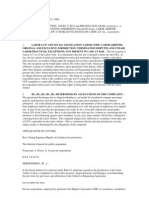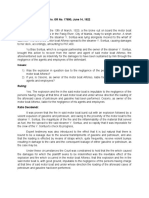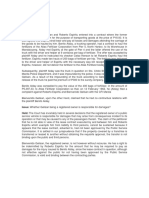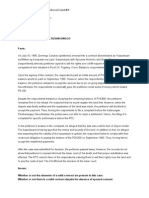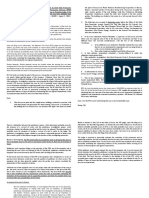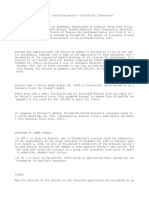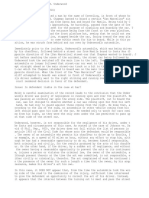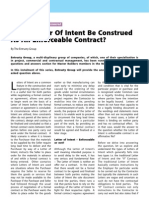0 ratings0% found this document useful (0 votes)
179 viewsAfrica vs. Caltex, Boquiren and The CA
Africa vs. Caltex, Boquiren and The CA
Uploaded by
Jenine QuiambaoCaltex was found liable for a fire that started at their gas station and spread to neighboring houses under the doctrine of res ipsa loquitur. The fire occurred while gasoline was being transferred from a tank truck into the underground storage tank at the gas station. The owners of the damaged houses sued Caltex. While the lower courts found no proof of negligence, the Supreme Court ruled that the doctrine of res ipsa loquitur applied because the gas station and its equipment were under Caltex's control, fires do not ordinarily occur without negligence during gasoline transfer, and Caltex provided no explanation for how the fire started. Caltex was therefore presumed negligent and liable for the damage caused by the fire.
Copyright:
© All Rights Reserved
Available Formats
Download as TXT, PDF, TXT or read online from Scribd
Africa vs. Caltex, Boquiren and The CA
Africa vs. Caltex, Boquiren and The CA
Uploaded by
Jenine Quiambao0 ratings0% found this document useful (0 votes)
179 views1 pageCaltex was found liable for a fire that started at their gas station and spread to neighboring houses under the doctrine of res ipsa loquitur. The fire occurred while gasoline was being transferred from a tank truck into the underground storage tank at the gas station. The owners of the damaged houses sued Caltex. While the lower courts found no proof of negligence, the Supreme Court ruled that the doctrine of res ipsa loquitur applied because the gas station and its equipment were under Caltex's control, fires do not ordinarily occur without negligence during gasoline transfer, and Caltex provided no explanation for how the fire started. Caltex was therefore presumed negligent and liable for the damage caused by the fire.
Original Description:
torts digest
Original Title
Africa vs. Caltex, Boquiren and the CA
Copyright
© © All Rights Reserved
Available Formats
TXT, PDF, TXT or read online from Scribd
Share this document
Did you find this document useful?
Is this content inappropriate?
Caltex was found liable for a fire that started at their gas station and spread to neighboring houses under the doctrine of res ipsa loquitur. The fire occurred while gasoline was being transferred from a tank truck into the underground storage tank at the gas station. The owners of the damaged houses sued Caltex. While the lower courts found no proof of negligence, the Supreme Court ruled that the doctrine of res ipsa loquitur applied because the gas station and its equipment were under Caltex's control, fires do not ordinarily occur without negligence during gasoline transfer, and Caltex provided no explanation for how the fire started. Caltex was therefore presumed negligent and liable for the damage caused by the fire.
Copyright:
© All Rights Reserved
Available Formats
Download as TXT, PDF, TXT or read online from Scribd
Download as txt, pdf, or txt
0 ratings0% found this document useful (0 votes)
179 views1 pageAfrica vs. Caltex, Boquiren and The CA
Africa vs. Caltex, Boquiren and The CA
Uploaded by
Jenine QuiambaoCaltex was found liable for a fire that started at their gas station and spread to neighboring houses under the doctrine of res ipsa loquitur. The fire occurred while gasoline was being transferred from a tank truck into the underground storage tank at the gas station. The owners of the damaged houses sued Caltex. While the lower courts found no proof of negligence, the Supreme Court ruled that the doctrine of res ipsa loquitur applied because the gas station and its equipment were under Caltex's control, fires do not ordinarily occur without negligence during gasoline transfer, and Caltex provided no explanation for how the fire started. Caltex was therefore presumed negligent and liable for the damage caused by the fire.
Copyright:
© All Rights Reserved
Available Formats
Download as TXT, PDF, TXT or read online from Scribd
Download as txt, pdf, or txt
You are on page 1of 1
Africa vs. Caltex, Boquiren and the CA| Makalintal G.R. No.
L-12986, March 31, 1
966 | 16 SCRA 448
FACTS
A fire broke out at the Caltex service station in Manila. It started whi
le gasoline was being hosed from a tank truck into the underground storage, righ
t at the opening of the receiving truck where the nozzle of the hose was inserte
d The fire then spread to and burned several neighboring houses, including the p
ersonal properties and effects inside them.
The owners of the houses, among them petitioners here, sued Caltex (owne
r of the station) and Boquiren (agent in charge of operation).
Trial court and CA found that petitioners failed to prove negligence and
that respondents had exercised due care in the premises and with respect to the
supervision of their employees. Both courts refused to apply the doctrine of re
s ipsa loquitur on the grounds that as to its applicability xxx in the Philippine
s, there seems to be nothing definite, and that while the rules do not prohibit i
ts adoption in appropriate cases, in the case at bar, however, we find no practic
al use for such docrtrine.
ISSUES & ARGUMENTS
W/N without proof as to the cause and origin of the fire, the doctrine of res ip
sa loquitur should apply as to presume negligence on the part of the appellees.
HOLDING & RATIO DECIDENDI
DOCTRINE OF RES IPSA LOQUITUR APPLIES. CALTEX LIABLE.
Res ipsa Loquitur is a rule to the effect that where the thing which caus
ed the injury complained of is shown to be under the management of defendant or
his servants and the accident is such as in the ordinary course of things does n
ot happen if those who have its management or control use proper care, it afford
s reasonable evidence, in absence of explanation of defendant, that the incident
happened because of want of care.
The aforesaid principle enunciated in Espiritu vs. Philippine Power and
Development Co. is applicable in this case. The gasoline station, with all its a
ppliances, equipment and employees, was under the control of appellees. A fire o
ccurred therein and spread to and burned the neighboring houses. The person who
knew or could have known how the fire started were the appellees and their emplo
yees, but they gave no explanation thereof whatsoever. It is fair and reasonable
inference that the incident happened because of want of care.
The report by the police officer regarding the fire, as well as the stat
ement of the driver of the gasoline tank wagon who was transferring the contents
thereof into the underground storage when the fire broke out, strengthen the pr
esumption of negligence. Verily, (1) the station is in a very busy district and
pedestrians often pass through or mill around the premises; (2) the area is used
as a car barn for around 10
taxicabs owned by Boquiren; (3) a store where people hang out and possibly smoke
cigarettes is located one meter from the hole of the underground tank; and (4)
the concrete walls adjoining the neighborhood are only 2 meters high at most and
cannot prevent the flames from leaping over it in case of fire.
Decision REVERSED. Caltex liable.
You might also like
- Sample Marital Settlement Agreement For CaliforniaDocument6 pagesSample Marital Settlement Agreement For CaliforniaStan Burman80% (5)
- Review 1Document2 pagesReview 1Jenine Quiambao100% (1)
- Engineering and Machinery Corporation v. CADocument2 pagesEngineering and Machinery Corporation v. CAJenine QuiambaoNo ratings yet
- 1.3 PNP Disciplinary MechanismDocument79 pages1.3 PNP Disciplinary Mechanismjohn ivanNo ratings yet
- Office of The Secretary To The Sangguniang PanlungsodDocument2 pagesOffice of The Secretary To The Sangguniang PanlungsodJames James100% (1)
- 12 Asseveration and Notice of Default IRS SAMPLEDocument4 pages12 Asseveration and Notice of Default IRS SAMPLEAngelus WatsonNo ratings yet
- Professional Ethics Project 2Document19 pagesProfessional Ethics Project 2Yash VermaNo ratings yet
- Africa vs. CaltexDocument2 pagesAfrica vs. CaltexKingNoeBadongNo ratings yet
- GR No. 172682, July 27, 2016 Sulpicio Lines Inc. V Napoleon SisanteDocument4 pagesGR No. 172682, July 27, 2016 Sulpicio Lines Inc. V Napoleon SisanteRoadtoforever123No ratings yet
- Republic Vs SandiganbayanDocument2 pagesRepublic Vs SandiganbayanVet LimNo ratings yet
- San Miguel Corporation Vs Heirs of Sabimiano InguitoDocument7 pagesSan Miguel Corporation Vs Heirs of Sabimiano InguitoMark Adrian ArellanoNo ratings yet
- 05 Yu Con V Ipil (Digest)Document2 pages05 Yu Con V Ipil (Digest)Karez MartinNo ratings yet
- Sampaco v. Lantud (2011) Case DigestDocument5 pagesSampaco v. Lantud (2011) Case DigestTan DaNo ratings yet
- Madrigal Shipping Vs OgilvieDocument2 pagesMadrigal Shipping Vs OgilvieNegou Xian TeNo ratings yet
- G.R. No. 84680Document7 pagesG.R. No. 84680Klein CarloNo ratings yet
- Transpo Law 3 CDDocument12 pagesTranspo Law 3 CDArah Obias CopeNo ratings yet
- Transportation Law WILLIAMS V YANGCODocument4 pagesTransportation Law WILLIAMS V YANGCOGracia Sullano100% (1)
- Asia Lighterage V CADocument3 pagesAsia Lighterage V CAAnonymous bOG2cv3KNo ratings yet
- San Miguel Vs NLRCDocument7 pagesSan Miguel Vs NLRCSharon Salmorin- BeloriaNo ratings yet
- American Insurance V Macondray GR No. L-23222 June 10, 1971Document2 pagesAmerican Insurance V Macondray GR No. L-23222 June 10, 1971Cristina OlaritaNo ratings yet
- Sotto V RuizDocument1 pageSotto V RuizJames Evan I. ObnamiaNo ratings yet
- American Insurance Co. vs. Compania MaritimaDocument3 pagesAmerican Insurance Co. vs. Compania MaritimaKiko AguilarNo ratings yet
- 17 Trans-Asia Shipping Lines v. CADocument1 page17 Trans-Asia Shipping Lines v. CALaura R. Prado-LopezNo ratings yet
- Belgian Overseas Chartering and Shipping NDocument3 pagesBelgian Overseas Chartering and Shipping NLatjing SolimanNo ratings yet
- Sarkies Tours Philippines Inc V CADocument2 pagesSarkies Tours Philippines Inc V CAjirah cheeNo ratings yet
- NATIONAL STEEL CORPORATION, Petitioner, vs. CADocument3 pagesNATIONAL STEEL CORPORATION, Petitioner, vs. CAVenus Jane FinuliarNo ratings yet
- Vda de Bataclan vs. MedinaDocument2 pagesVda de Bataclan vs. MedinaAngel MaeNo ratings yet
- Yu Biao Sontua vs. Ossorio. GR No. 17690, June 14, 1922Document2 pagesYu Biao Sontua vs. Ossorio. GR No. 17690, June 14, 1922AJ LeoNo ratings yet
- Central Mindanao University vs. Department of Agrarian Reform Adjudication BoardDocument18 pagesCentral Mindanao University vs. Department of Agrarian Reform Adjudication BoardPMV100% (1)
- Chua Yek Hong V IACDocument2 pagesChua Yek Hong V IACFrederick Xavier LimNo ratings yet
- Transpo DigestDocument24 pagesTranspo DigestRaine VerdanNo ratings yet
- 022 Ynchausti Steamship, Co. v. DexterDocument2 pages022 Ynchausti Steamship, Co. v. Dexterthornapple25No ratings yet
- Brgy. San Roque v. Heirs of PastorDocument1 pageBrgy. San Roque v. Heirs of PastorAya BeltranNo ratings yet
- Saludo, Jr. Vs CA, Trans World Airlines, Inc., and Phil Airlines, Inc.Document2 pagesSaludo, Jr. Vs CA, Trans World Airlines, Inc., and Phil Airlines, Inc.Amado EspejoNo ratings yet
- PNR V BruntyDocument21 pagesPNR V BruntyyousirneighmNo ratings yet
- Manila Steamship Co Vs AbdulhamanDocument4 pagesManila Steamship Co Vs AbdulhamanRoseve BatomalaqueNo ratings yet
- Mallari vs. Court of Appeals Facts: Transportation and Traffic Code Which ProvidesDocument2 pagesMallari vs. Court of Appeals Facts: Transportation and Traffic Code Which ProvidesQueenie SabladaNo ratings yet
- Sarabia v. PeopleDocument2 pagesSarabia v. PeopleTrixie PeraltaNo ratings yet
- PRINT! Kulang Na Digest-Reviewer For SpecproDocument11 pagesPRINT! Kulang Na Digest-Reviewer For Specprocmv mendozaNo ratings yet
- 17 Santos Vs NLRCDocument4 pages17 Santos Vs NLRCImariNo ratings yet
- Unsworth Transport International Inc. v. CADocument9 pagesUnsworth Transport International Inc. v. CAValentine MoralesNo ratings yet
- 7 Ang vs. American Steamship Agencies, G.R. No. L-22491 PDFDocument9 pages7 Ang vs. American Steamship Agencies, G.R. No. L-22491 PDFpa0l0sNo ratings yet
- Sumbang Jr. v. General Court Martial PRO G.R. No. 140188Document1 pageSumbang Jr. v. General Court Martial PRO G.R. No. 140188JP Murao IIINo ratings yet
- Planters Products, Inc. vs. Court of AppealsDocument4 pagesPlanters Products, Inc. vs. Court of Appealsmei atienzaNo ratings yet
- Classical Theory of State ImmunityDocument1 pageClassical Theory of State ImmunityEmmanuelle Xriz AtilNo ratings yet
- Loadmasters vs. GlodelDocument3 pagesLoadmasters vs. GlodelEmpleo MaryNo ratings yet
- LABOR2PART6Document10 pagesLABOR2PART6Carlo PajoNo ratings yet
- Tuason V CADocument2 pagesTuason V CAKylie Kaur Manalon DadoNo ratings yet
- Air France vs. Bonifacio H. Gillego (G.R. NO. 165266, DECEMBER 15, 2010) FactsDocument2 pagesAir France vs. Bonifacio H. Gillego (G.R. NO. 165266, DECEMBER 15, 2010) FactsFeBrluado100% (1)
- Case Digest 104 Phil 75Document2 pagesCase Digest 104 Phil 75Maria Danice AngelaNo ratings yet
- Benedicto V IacDocument1 pageBenedicto V IacElaizza ConcepcionNo ratings yet
- Case DigestDocument11 pagesCase DigestDiana Mae Liban CordovaNo ratings yet
- Lu Do & Lu Ym Corp. vs. BinamiraDocument1 pageLu Do & Lu Ym Corp. vs. BinamiraRhea CalabinesNo ratings yet
- 26Document5 pages26Michael Granville MonNo ratings yet
- National Development Corporation v. Court of AppealsDocument1 pageNational Development Corporation v. Court of AppealsReth GuevarraNo ratings yet
- Prior-Operator Rule Batangas Transportation vs. OrlanesDocument1 pagePrior-Operator Rule Batangas Transportation vs. OrlanesMaricar Corina CanayaNo ratings yet
- Fajardo v. Garcia G.R. No. L-38675Document5 pagesFajardo v. Garcia G.R. No. L-38675AliyahDazaSandersNo ratings yet
- Belgian Overseas vs. PFI DigestDocument2 pagesBelgian Overseas vs. PFI DigestMARRYROSE LASHERASNo ratings yet
- Heirs of Ruiz, Edmond Ruiz Vs CA (DIGESTED)Document2 pagesHeirs of Ruiz, Edmond Ruiz Vs CA (DIGESTED)Jonathan UyNo ratings yet
- Iloilo Ice and Cold Storage Co. v. Public Utility BoardDocument8 pagesIloilo Ice and Cold Storage Co. v. Public Utility BoardClarence ProtacioNo ratings yet
- Carabeo Vs Spouses DingcoDocument2 pagesCarabeo Vs Spouses DingcoFrankneil AdduculNo ratings yet
- 43 People Vs CA 626 S 352Document2 pages43 People Vs CA 626 S 352DarwinNo ratings yet
- Edgar Cokaliong Shipping Vs UcpbDocument3 pagesEdgar Cokaliong Shipping Vs UcpbKylie Kaur Manalon DadoNo ratings yet
- 18.02 - Delsan Transport Lines, Inc. vs. CA, 369 SCRA 24Document4 pages18.02 - Delsan Transport Lines, Inc. vs. CA, 369 SCRA 24R.A. GregorioNo ratings yet
- B13 Philippine Bank of Commerce Vs Court of AppealsDocument2 pagesB13 Philippine Bank of Commerce Vs Court of AppealsJ CaparasNo ratings yet
- Africa vs. Caltex L-12986 (TORTS)Document1 pageAfrica vs. Caltex L-12986 (TORTS)Jacinto Jr Jamero100% (1)
- 23 Africa v. Caltex (Proof of Negligence)Document2 pages23 Africa v. Caltex (Proof of Negligence)Joshua Erik Madria100% (2)
- Eternal Gardens Memorial Park Corporation V Philamlife (Insurance)Document3 pagesEternal Gardens Memorial Park Corporation V Philamlife (Insurance)Jenine QuiambaoNo ratings yet
- Mallari Sr. and Mallari Jr. v. CA and Bulletin Publishing Corp.Document3 pagesMallari Sr. and Mallari Jr. v. CA and Bulletin Publishing Corp.Jenine QuiambaoNo ratings yet
- Intra-Strata Assurance Corporation v. RepublicDocument1 pageIntra-Strata Assurance Corporation v. RepublicJenine QuiambaoNo ratings yet
- The Power of Positive Thinking Key TakeawaysDocument12 pagesThe Power of Positive Thinking Key TakeawaysJenine QuiambaoNo ratings yet
- Manila Electric Co. vs. RemoquilloDocument1 pageManila Electric Co. vs. RemoquilloJenine QuiambaoNo ratings yet
- Makati Shangri-La vs. HarperDocument2 pagesMakati Shangri-La vs. HarperJenine QuiambaoNo ratings yet
- Fabrigas Vs San Francico Del MonteDocument2 pagesFabrigas Vs San Francico Del MonteJenine QuiambaoNo ratings yet
- Elisco Tool MFG Corp vs. CADocument1 pageElisco Tool MFG Corp vs. CAJenine QuiambaoNo ratings yet
- Francisco V BoiserDocument2 pagesFrancisco V BoiserJenine QuiambaoNo ratings yet
- Hanopol vs. PilapilDocument1 pageHanopol vs. PilapilJenine QuiambaoNo ratings yet
- Dagupan Trading vs. MacamDocument1 pageDagupan Trading vs. MacamJenine QuiambaoNo ratings yet
- Mahusay vs. B.E. San Diego, IncDocument2 pagesMahusay vs. B.E. San Diego, IncJenine Quiambao100% (1)
- Lilius vs. Manila Railroad Co. 59 Phil. 758Document1 pageLilius vs. Manila Railroad Co. 59 Phil. 758Jenine QuiambaoNo ratings yet
- Penullar vs. PNBDocument2 pagesPenullar vs. PNBJenine QuiambaoNo ratings yet
- Lawyers Cooperative Publishing V TaboraDocument1 pageLawyers Cooperative Publishing V TaboraJenine QuiambaoNo ratings yet
- Behn Meyer vs. YangcoDocument3 pagesBehn Meyer vs. YangcoJenine QuiambaoNo ratings yet
- Agricultural and Home Extension Development Group vs. CADocument3 pagesAgricultural and Home Extension Development Group vs. CAJenine QuiambaoNo ratings yet
- Layugan vs. IACDocument2 pagesLayugan vs. IACJenine Quiambao100% (1)
- Anonymous Letter-Complaint Against Atty. Miguel Morales, Clerk of Court, MeTC ManilaDocument2 pagesAnonymous Letter-Complaint Against Atty. Miguel Morales, Clerk of Court, MeTC ManilaJenine QuiambaoNo ratings yet
- Guilatco vs. City of DagupanDocument1 pageGuilatco vs. City of DagupanJenine QuiambaoNo ratings yet
- Asuncion vs. Court of AppealsDocument2 pagesAsuncion vs. Court of AppealsJenine QuiambaoNo ratings yet
- People v. EvaristoDocument2 pagesPeople v. EvaristoJenine QuiambaoNo ratings yet
- J. H. Chapman vs. James M. UnderwoodDocument3 pagesJ. H. Chapman vs. James M. UnderwoodJenine QuiambaoNo ratings yet
- Republic Bank Vs EbradaDocument2 pagesRepublic Bank Vs EbradaRalph Christian Lusanta FuentesNo ratings yet
- Model Counter in Hmop CaseDocument8 pagesModel Counter in Hmop Casesurya prakashNo ratings yet
- Romisha Gurung CPCDocument15 pagesRomisha Gurung CPCAkansha Kashyap100% (1)
- (U) Daily Activity Report: Marshall DistrictDocument5 pages(U) Daily Activity Report: Marshall DistrictFauquier NowNo ratings yet
- Disclosure On Interested Party TransactionDocument2 pagesDisclosure On Interested Party TransactionoundhakarNo ratings yet
- Application Form For Private Security AgencyDocument6 pagesApplication Form For Private Security AgencyRajesh Singh80% (5)
- MKT - 344 Lecture #17, 18, 19 & 20 Social Class, Family, Culture, Subculture & Cross-Cultural BehaviorDocument47 pagesMKT - 344 Lecture #17, 18, 19 & 20 Social Class, Family, Culture, Subculture & Cross-Cultural BehaviorNawar E JannatNo ratings yet
- Daily Nation 16.05.2013Document96 pagesDaily Nation 16.05.2013Zachary Monroe100% (1)
- CivPro Atty. Custodio Case DigestsDocument12 pagesCivPro Atty. Custodio Case DigestsTon RiveraNo ratings yet
- 10 Manufacturers Hanover Trust Vs GuerreroDocument157 pages10 Manufacturers Hanover Trust Vs GuerreroChara GalaNo ratings yet
- Trudeau Civil Case Document 879 and Exhibits Trudeau Motion To Compel Receiver To File Tax Returns and File A Status Report 04-01-15Document30 pagesTrudeau Civil Case Document 879 and Exhibits Trudeau Motion To Compel Receiver To File Tax Returns and File A Status Report 04-01-15CosmicConnieNo ratings yet
- CD - Gapayao v. Fulo, SSSDocument2 pagesCD - Gapayao v. Fulo, SSSJane SudarioNo ratings yet
- First Amended Petition and Tro-2Document14 pagesFirst Amended Petition and Tro-2callertimesNo ratings yet
- Punjab Municipal Act 1911 PDFDocument17 pagesPunjab Municipal Act 1911 PDFAnonymous 4cxYhRej9No ratings yet
- Module IV POBC PCPL Panida Kharel Joy Abra PPODocument2 pagesModule IV POBC PCPL Panida Kharel Joy Abra PPOJayson Guerrero100% (1)
- Comparative Law, Common and Civil Law - CBDocument6 pagesComparative Law, Common and Civil Law - CBNiranjan NairNo ratings yet
- Public Opinion and The Rehnquist Court - Marshall, Thomas R. (Author)Document283 pagesPublic Opinion and The Rehnquist Court - Marshall, Thomas R. (Author)Han FebryanNo ratings yet
- ORIEL MAGNO v. CA, GR No. 96132, 1992-06-26Document2 pagesORIEL MAGNO v. CA, GR No. 96132, 1992-06-26Rhodz Coyoca EmbalsadoNo ratings yet
- Sitting ArrangementDocument6 pagesSitting ArrangementHarsha TpsNo ratings yet
- Report On Legal Medicine PowerpointDocument31 pagesReport On Legal Medicine PowerpointEdwin VillaNo ratings yet
- Motion For Plea Bargain CabuyaoDocument2 pagesMotion For Plea Bargain CabuyaoRaffy PangilinanNo ratings yet
- Polygamy Should Be LegalizedDocument1 pagePolygamy Should Be LegalizedVlad DimsonNo ratings yet
- @entrusty Letter of IntentDocument5 pages@entrusty Letter of Intentola789No ratings yet
- CASE DIGEST Cruz v. Secretary of EnvironDocument3 pagesCASE DIGEST Cruz v. Secretary of EnvironRoger AquinoNo ratings yet
- Petitioner: Republic of The Philippines Respondents: Court of Appeals and Maximo WongDocument2 pagesPetitioner: Republic of The Philippines Respondents: Court of Appeals and Maximo Wongnikol crisangNo ratings yet


















